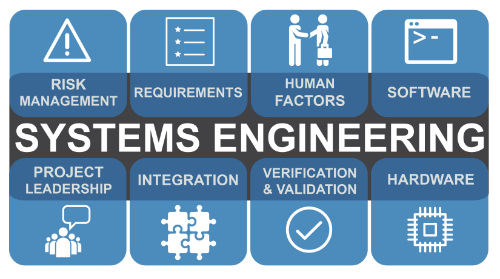SYSTEM ENGINEERING IS ABOUT COPING WITH COMPLEXITY
what is SYSTEM ENGINEERING?
Systems engineering is an interdisciplinary engineering and management field focusing on designing, integrating, and managing complex systems. It involves a holistic and structured approach to problem-solving to deliver reliable, efficient, and cost-effective solutions to meet specific objectives or address complex challenges.
Critical aspects of systems engineering include:
- Systems Thinking: Systems engineers consider the entire system and its interactions rather than focusing solely on individual components. They analyze how different parts of the system work together and how changes in one area may affect the overall performance.
- Requirements Analysis: Systems engineers define and manage the requirements that the system must meet, ensuring that they are clear, complete, and consistent. These requirements serve as the foundation for design and development.
- Design and Architecture: Systems engineers create a structured design and architectural framework for the system. They decide the system's structure, components, interfaces, and functionality.
- Integration and Testing: Systems engineers oversee the integration of system components, verifying that they work together as intended. They also test and validate to ensure the system meets the specified requirements.
- Risk Management: Identifying and mitigating risks is critical to systems engineering. Engineers assess potential risks and develop strategies to manage them effectively.
- Lifecycle Management: Systems engineering covers the entire lifecycle of a system, from concept and design through development, testing, deployment, and operation to eventual retirement or decommissioning.
- Interdisciplinary Collaboration: Systems engineering involves collaboration among various disciplines, including mechanical, electrical, software, and human factors engineering, as well as management and stakeholders from different domains.
- Optimization: Systems engineers seek to optimize the system's performance, cost-effectiveness, reliability, and other relevant factors to meet the desired objectives.
Various industries use system engineering, including aerospace, defence, automotive, healthcare, information technology, and manufacturing. It is a systematic approach to problem-solving that ensures that complex systems meet the needs and expectations of stakeholders while managing risks and resources effectively.

Source: International Council on Systems Engineering™ (INCOSE®). All rights reserved.
THE HARD AND POWER SKILLS ALL SYSTEMS ENGINEERS MUST POSSES
Systems engineers require hard and soft skills to design, develop, and manage complex systems effectively. Here are some of the essential hard and power skills of a systems engineer:
Hard Skills:
- Technical Proficiency: Systems engineers need a solid technical foundation in their respective domains, such as mechanical, electrical, software, or aerospace engineering, depending on the field of application.
- Mathematical and Analytical Skills: They should possess advanced mathematical and analytical skills to model and analyze complex systems, perform trade-off analyses, and make data-driven decisions.
- Systems Engineering Methodologies: Knowledge of systems engineering frameworks and methodologies, such as the Systems Engineering V-model or Model-Based Systems Engineering (MBSE), is essential.
- Requirements Engineering: The ability to elicit, document, and manage requirements effectively is crucial for defining the system's scope and objectives.
- Modelling and Simulation Tools: Proficiency in using software tools for modelling, simulation, and analysis, like MATLAB, Simulink, or CAD software, is often required.
- Quality Assurance and Testing: Familiarity with quality assurance processes, testing methodologies, and validation techniques is essential to ensure the system meets its requirements.
- Configuration Management: Understanding configuration management principles for tracking and controlling changes to system components and documentation is vital.
- Risk Management: Skills in identifying, assessing, and mitigating system design and development risks are necessary to ensure project success.
Power Skills:
- Communication: Effective verbal and written communication skills are essential for conveying complex technical concepts to technical and non-technical stakeholders.
- Collaboration: Systems engineers often work in interdisciplinary teams. Strong collaboration skills are needed to facilitate teamwork and resolve conflicts.
- Problem-Solving: The ability to think critically and solve complex problems is fundamental to systems engineering, as it addresses multifaceted challenges.
- Leadership: Systems engineers may lead or coordinate teams. Leadership skills help in guiding and motivating team members toward common objectives.
- Adaptability: The capacity to adapt to changing project requirements, technologies, and priorities is crucial in dynamic environments.
- Project Management: Understanding project management principles, including scheduling, budgeting, and resource allocation, helps deliver projects on time and within budget.
- Stakeholder Management: Systems engineers must effectively engage with various stakeholders, including clients, end-users, and management, to ensure alignment with project goals.
- Ethical and Professional Behavior: Upholding ethical standards and professional conduct is vital in maintaining trust and integrity in the field.
- Customer Focus: Keeping the end-users' needs and satisfaction in mind throughout the system's lifecycle is essential for successful solutions.
- Systems Thinking: Developing a holistic perspective and considering the broader context and implications of decisions is a foundational soft skill for systems engineers.
Successful systems engineers possess a balanced combination of these hard and power skills, allowing them to navigate the technical and interpersonal complexities of their roles successfully.


